Supreme Court
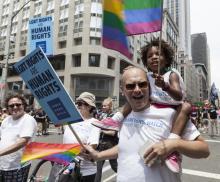
By the end of June — and as early as next week — the Supreme Court is expected to rule on the legality of gay marriage nationwide. In a pre-emptive move to refocus narrative and legislative control at the state level, two states this week enacted laws designed to protect religious objection to same-sex couples. Here's how.
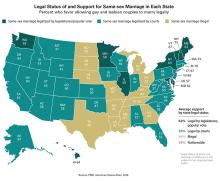
Most Americans — including people from every major religious group — predict gay marriage will be legalized nationwide when a hotly anticipated Supreme Court ruling is announced later this month.
Among those who favor legalizing same-sex marriage, 80 percent think the high court will rule their way, according to a survey by the Public Religion Research Institute released June 11. And among those who oppose gay marriage, 47 percent say that’s the likely outcome, too.
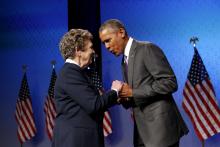
With some members of Congress and Health and Human Services Secretary Sylvia Burwell in the audience, Obama’s speech was entirely about the success of his signature legislation and the need to keep it alive.
Obama recited statistics on how many uninsured are now covered and on the economic value of “portable plans in a competitive marketplace.” But he anchored his speech in the faith-based association’s moral calling.
“What kind of country do we want to be?” he asked in a series of rhetorical questions:
Is access to care a commodity “only for the highest bidders?” Or is it “a fundamental right?”

The Supreme Court on June 8 declined to insert itself into the middle of the Israeli-Palestinian issue by second-guessing U.S. policy on Jerusalem.
Ruling just a few months after a feud between President Obama and Israeli Prime Minister Benjamin Netanyahu, the justices refused to allow Americans born in Jerusalem to have their passports changed to reflect Israel as their birthplace, as Congress demanded more than a decade ago.
In denying the challenge waged by the Jewish parents of a 12-year-old almost since his birth in 2002, a majority of justices heeded the State Department’s warning that a simple passport alteration could “provoke uproar throughout the Arab and Muslim world.”

The Supreme Court ruled June 1 that companies cannot discriminate against job applicants or employees for religious reasons, even if an accommodation is not requested.
The decision was a defeat for preppy clothier Abercrombie & Fitch, which refused to hire a Muslim girl in 2008 because she was wearing a black hijab, or head scarf. It could benefit job applicants and employees who need time off for religious observances as well as those who adhere to strict dress codes.

Graham, president of the Billy Graham Evangelistic Association and the Samaritan’s Purse charity, describes Justice Sonia Sotomayor, the subject of his latest post, as the daughter of immigrants who made good on the American dream.
“Unfortunately,” the post continues, “she is also an example of someone who seems to be very misguided on the issue of same-sex marriage. She voted to strike down the federal Defense of Marriage Act in 2014, and homosexual advocates consider her an ally in their fight to make same-sex marriage the law of the land.”
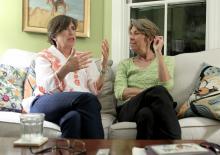
Same-sex marriage is so last decade in Massachusetts. These days, the earliest pioneers in gay and lesbian matrimony are demonstrating how to raise kids, retire — even divorce.
As the Supreme Court wrestles with what Chief Justice John Roberts last month labeled a redefinition of marriage, the couples who successfully challenged the Bay State’s ban on gay marriage in 2003 are juggling work and retirement, raising kids who turn down Ivy League colleges, and holding joyful family reunions.

The U.S. Supreme Court is now weighing arguments in the same-sex marriage case it heard on April 28 that could lead to a landmark decision requiring all states to acknowledge the unions.
But don’t count Texas out without a fight.
State lawmakers are considering at least five bills designed to block same-sex marriages, which are currently illegal in the state, and some state leaders say they’ll battle to bar the unions regardless of any Supreme Court decision.
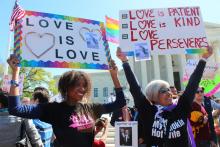
People who argue against marriage equality frequently do so for religious reasons, even if they cast their argument in secular terms. While I believe there are strong constitutional arguments for striking down bans on marriage equality, I support striking down these bans because of my faith, not in spite of it.
For too long, religious institutions have contributed to the scourge of homophobia that fuels the discrimination that this case seeks to strike down. Far too many of us are familiar with the discrimination, fear, and violence that gay and lesbian people have suffered while people of faith turned a blind eye or, worse yet, acted as perpetrators.
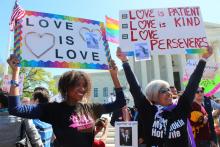
WASHINGTON — As the nine Supreme Court justices took up the vexing question of a constitutional right to same-sex marriage on Tuesday, the case came down to two competing visions of marriage: what it’s been, what it should be, and who gets to decide.
Outside the court, hundreds of demonstrators echoed both sides: Amateur evangelists and anti-gay zealots with signs proclaiming, “Man & Woman: United for Life, Open to Life,” and throngs of gay rights supporters chanting “Love Must Win!” to drown out the sidewalk preachers with their megaphones.
Yet ultimately, beyond both the arcane and real-life arguments over the state’s sanction of private relationships, the court must decide the very nature and purpose of marriage — or at least which nature will be reflected in civil law.
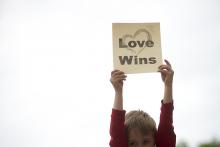
It is perhaps the most controversial component of the national debate over same-sex marriage: Who should raise children?
The judge who wrote the decision upholding gay marriage bans in four Midwest states gave at least some same-sex couples a shoutout last fall, even while ruling against them. His ruling is being appealed to the Supreme Court, which will hear oral arguments April 28.
Judge Jeffrey Sutton’s words have done little to quell the war of statistics and academic studies that has raged for years over the relative child-rearing skills of gay and straight parents.
Dozens of briefs submitted to the court cite scores of scientific studies on the subject. Some show that children raised in same-sex households fare no worse than those raised by mothers and fathers. Others say the differences are stark in areas ranging from emotional development to high school graduation rates and success at work.
The judge who looked most closely at the two sides’ arguments wasn’t Sutton but U.S. District Judge Bernard Friedman, who conducted a two-week trial last year to consider April DeBoer and Jayne Rowse’s lawsuit against Michigan’s gay marriage ban. He came down firmly on the side of studies showing no difference between gay and heterosexual child-rearing.
Researchers claiming negative outcomes for children of same-sex couples “clearly represent a fringe viewpoint that is rejected by the vast majority of their colleagues across a variety of social science fields,” Friedman wrote.
While rejecting the “fringe” label, some conservatives acknowledge that sufficient research has not been done to show that same-sex parenting harms children’s development. They contend the question remains open to debate.

The Supreme Court will hear arguments next week in a landmark case on gay marriage, but most Americans already have made up their minds: There’s no turning back.
In a nationwide USA Today/Suffolk University poll, those surveyed say by 51 percent to 35 percent that it’s no longer practical for the Supreme Court to ban same-sex marriages because so many states have legalized them.
One reason for a transformation in public views on the issue: close to half say they have a gay or lesbian family member or close friend who is married to someone of the same sex.
Kraig Ziegler, 58, of Flagstaff, Ariz., acknowledged being a bit uncomfortable when he attended a wedding reception for two men, friends of his wife, who had married.
“I still believe what the Bible says, ‘one man, one woman,’ ” the mechanic, who was among those polled, said in a follow-up interview.
On the other hand, he said, “I got to know the guys, and they’re all right. They don’t make passes or anything at me.”
Now he calls himself undecided on the issue.
In the survey, a majority — 51 percent 35 percent — favor allowing gay men and lesbians to marry, and those who support the idea feel more strongly about it than those who oppose it: 28 percent “strongly favor” same-sex marriage, 18 percent “strongly oppose” it. Fourteen percent are undecided.

A Mormon man and woman in a mixed-orientation marriage are objecting to their inclusion in a U.S. Supreme Court case filing because it argues that legalized gay marriage would demean marriages like theirs.
Josh and Lolly Weed’s names and statements are referenced in a “friend of the court” brief ahead of the April 28 arguments in a consolidated 6th Circuit Court of Appeals case, which many expect will legalize gay marriage nationwide.
The brief was filed April 3 on behalf of couples in mixed-orientation marriages — unions in which one partner is gay and the other is not — who oppose marriage equality.
The Weeds told The Salt Lake Tribune on April 14 they didn’t consent to be included in the filing, nor do they share its view.
Among the filing’s arguments: Constitutionally mandated same-sex marriages can exist only by “erasing, marginalizing and demeaning the same-sex attracted who live in man-woman marriages” and would send a “harmful message that it is impossible, unnatural, and dangerous for the same-sex attracted to marry members of the opposite sex.”
“What does that have to do with us at all?” asked Josh Weed, an openly gay man who has been married to a woman for 12 years.
“I feel no devaluation of my marriage status by having marriage equality.”
The Weeds, of Washington state, became the public face of Mormon mixed-orientation marriage in 2012, when they posted their story on Josh’s blog, joshweed.com. They do not advocate mixed-orientation marriages for others.
“My wife and I support marriage equality,” Josh Weed said.
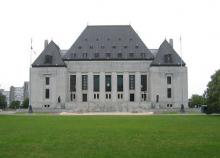
Canada’s Supreme Court has ruled that a small town in Quebec may not open its council meetings with prayer.
In a unanimous ruling April 15, Canada’s highest court ruled that the town of Saguenay can no longer publicly recite a Catholic prayer because it infringes on freedom of conscience and religion.
The case dates back to 2007, when a resident of Saguenay complained about public prayer at City Hall.
Just last year, a divided U.S. Supreme Court ruled that legislative bodies such as city councils could begin their meetings with prayer, even if it plainly favors a specific religion.
But the Canadian high court ruled that the country’s social mores have “given rise to a concept of neutrality according to which the state must not interfere in religion and beliefs. The state must instead remain neutral in this regard. This neutrality requires that the state neither favor nor hinder any particular belief, and the same holds true for non belief.”
The court said a nondenominational prayer is still religious in nature and would exclude nonbelievers.

Jim Obergefell and John Arthur spent more than two decades living quietly together. They were never gay rights activists. Most of their friends weren’t even gay.
“John and I always joked that we were bad gays,” Obergefell recalled, “because the vast majority of our friends are straight couples.”
But when the Supreme Court ruled on June 26, 2013, that the federal government must recognize same-sex marriages, two new activists suddenly were born — one of whom now stands at the threshold of legal history.
Fifteen days after the high court’s ruling — with Arthur in the final stages of Lou Gehrig’s Disease — the couple flew to Maryland on a medically equipped jet to be legally married on the tarmac. Then they flew back home and learned their marriage would not be recognized in Ohio.
“All I thought was, ‘This isn’t right. I’m p—ed off,'” Obergefell, 48, says now, sitting in the silence of his art-filled condominium in Cincinnati’s historic Over the Rhine district.
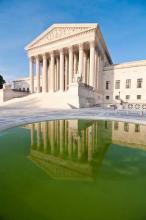
Republican officials and religious organizations dominate a growing list of more than 60 groups urging the Supreme Court to uphold state bans against same-sex marriage.
The flood of “friend of the court” briefs arriving at the court by last week’s deadline easily made the upcoming case the most heavily lobbied in the court’s recent history. Earlier this month, more than 70 briefs were filed by proponents of gay marriage, including one signed by more than 200,000 people.
Sixteen states led by Republican governors were among those calling for the bans in Michigan, Ohio, Kentucky, and Tennessee to be upheld. Among them were nine states where same-sex marriage bans have been struck down by federal courts — an indication that the battle there and elsewhere will be renewed if the justices uphold the bans.
“How much better for this issue to play out, state-by-state, with citizens locked in urgent conversation,” one of the briefs says.

WITH THE NEXT election still almost 18 months away, you’d think the media would focus on more important topics in the meantime, such as where Kim Kardashian is spending her next vacation.
But you’d be wrong. It’s officially time for the press to ignore more newsworthy subjects in favor of endless coverage of the election “horse race,” but without the legendary good sense horses bring to such occasions.
ISIS on the move, taking the Middle East back to the 7th century? Forget that. Let’s talk about Jeb Bush’s 2016 run, although the hook could be how ISIS reminds people of the disastrous policies of the last Bush in the White House. Or was it the one before that? I can’t remember. (In hindsight, the Bush parents should have named alltheir sons George, so presidential ballots could be printed in bulk, enough for several elections.)
1. How Yemen Became the Middle East’s Latest Regional Nightmare
As Saudi Arabia and Egypt say they’re prepared to send in ground troops, here’s a look at how Yemen got to this point.
2. God and Jeb
“[Jeb] Bush wants Christian conservatives to pay attention to what he's done, not just to what he says. But in a Republican presidential primary, can actions — much less actions more than a decade in the past — actually speak louder than words? Can quiet faith, and quiet support from some religious leaders, carry the day against a field full of outspoken Christian warriors?”
3. A Response to Critics of the Open Letter to Franklin Graham
“Jesus says ‘If another member of the church sins against you, go and point out the fault when the two of you are alone.’ Jesus does not say, ‘If another member of the church sins against millions, and hundreds of thousands begin to follow his lead on the issue, go and point out the fault when the two of you are alone.’”
4. Women & Leadership: Public Says Women Are Equally Qualified, but Barriers Exist
And it might not be the barriers you would think. “Only about one-in-five say women’s family responsibilities are a major reason there aren’t more females in top leadership positions in business and politics. Instead, topping the list of reasons, about four-in-ten Americans point to a double standard for women seeking to climb to the highest levels of either politics or business, where they have to do more than their male counterparts to prove themselves. Similar shares say the electorate and corporate America are just not ready to put more women in top leadership positions.”
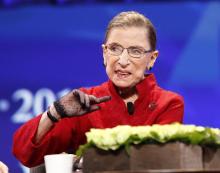
Rabbi Ruth Bader Ginsburg?
Not quite, but when a Jewish nonprofit asked the Supreme Court justice to write a biblical commentary for Passover, she agreed, and added a feminist twist: It would raise up the often overlooked women of the Exodus story.
Ginsburg, one of three Jews and three women on the high court, is known as a champion of women’s rights — but not for being particularly religious.
But Rabbi Lauren Holtzblatt, whom Ginsburg asked to help out with the commentary, said Ginsburg had a clear vision for the piece and knew exactly which biblical women she wanted to highlight from the iconic liberation story of the Book of Exodus.
“She has a Jewish soul, there is no question,” Holtzblatt, a rabbi at Adas Israel, a Conservative synagogue in Washington, D.C., said of Ginsburg.
“It’s in her. It’s deeply in her.”

Samantha Elauf was a teenager who loved clothes and applied to work in an Abercrombie & Fitch Kids store in her native Tulsa, Okla., in 2008. But Elauf, a Muslim, also happens to wear a headscarf. So she didn’t get the job.
No one — not even Abercrombie & Fitch — disputes that her hijab cost her the job offer. And the law, Title VII of the Civil Rights Act of 1964, states that an employer can’t deny employment based on an worker’s religious practice, unless accommodating it would prove terribly burdensome.
At the time, Abercrombie had a “no hats” policy for its sales associates. When the U.S. Supreme Court heard Elauf’s case on Feb. 25, Justice Ruth Bader Ginsburg summed up the religious exemption required of the company: “Title VII doesn’t require accommodating baseball caps, but it does require accommodating religious practice.”
So why did this case make it all the way to the Supreme Court?
Elauf, though she won in a federal district court in 2011, lost in a federal appeals court in 2013. At the 10th U.S. Circuit Court of Appeals in Denver, the company’s argument — that it shouldn’t have had to give a religious accommodation because Elauf never asked for one — found traction.
Do we really want companies delving into an applicant’s religious practice in order to determine whether the person might want an accommodation, Abercrombie lawyer Shay Dvoretzky asked the justices on Wednesday.
“This will inevitably lead employers to stereotype,” he said.